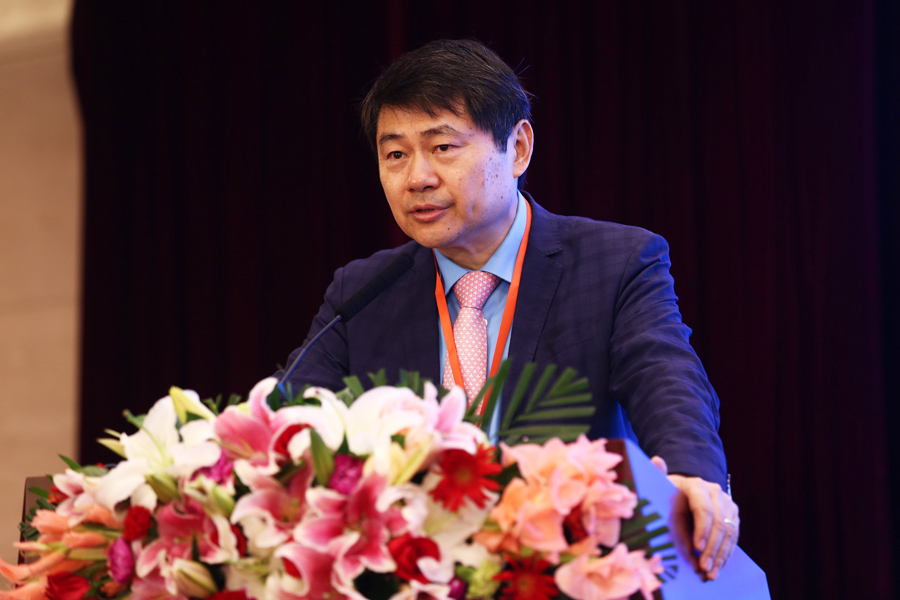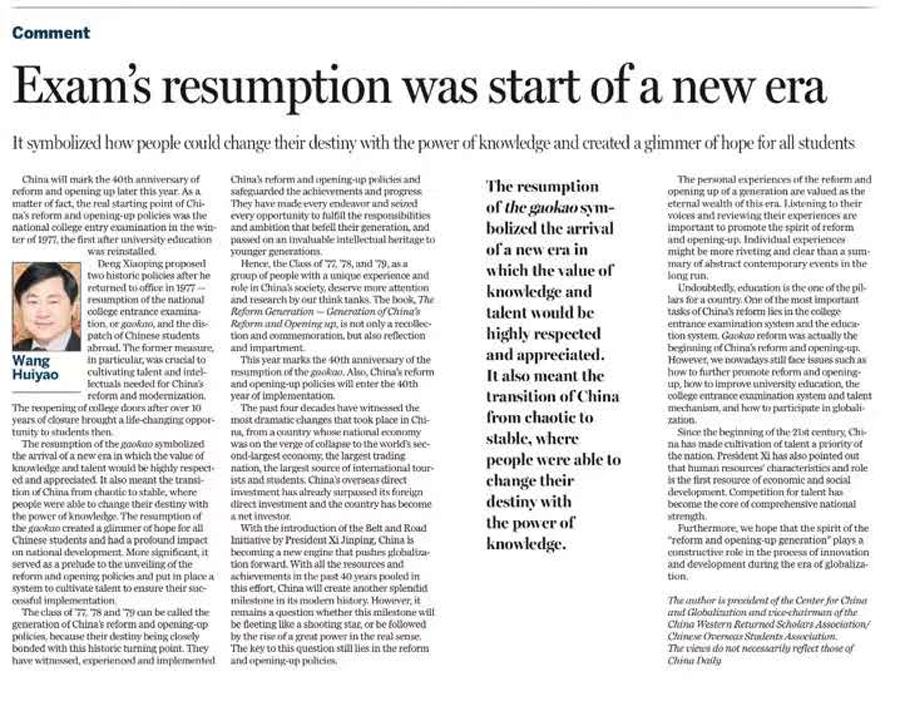Wang Huiyao: Exam’s resumption was start of a new era
August 11 , 2017

Wang Huiyao, president of the Center for China and Globalization(CCG) and vice-chairman of the China Western Returned Scholars Association/Chinese Overseas Students Association.
It symbolized how people could change their destiny with the power of knowledge and created a glimmer of hope for all students
China will mark the 40th anniversary of reform and opening up later this year. As a matter of fact, the real starting point of China’s reform and opening-up policies was the national college entry examination in the winter of 1977, the first after university education was reinstalled.
Deng Xiaoping proposed two historic policies after he returned to office in 1977-resumption of the national college entrance examination, or gaokao, and the dispatch of Chinese students abroad. The former measure, in particular, was crucial to cultivating talent and intellectuals needed for China’s reform and modernization. The reopening of college doors after over 10 years of closure brought a life-changing opportunity to students then.
The resumption of the gaokao symbolized the arrival of a new era in which the value of knowledge and talent would be highly respected and appreciated. It also meant the transition of China from chaotic to stable, where people were able to change their destiny with the power of knowledge. The resumption of the gaokao created a glimmer of hope for all Chinese students and had a profound impact on national development. More significant, it served as a prelude to the unveiling of the reform and opening policies and put in place a system to cultivate talent to ensure their successful implementation.
The class of ’77, ’78 and ’79 can be called the generation of China’s reform and opening-up policies, because their destiny being closely bonded with this historic turning point. They have witnessed, experienced and implemented China’s reform and opening-up policies and safeguarded the achievements and progress. They have made every endeavor and seized every opportunity to fulfill the responsibilities and ambition that befell their generation, and passed on an invaluable intellectual heritage to younger generations.
Hence, the Class of ’77,’78, and ’79, as a group of people with a unique experience and role in China’s society, deserve more attention and research by our think tanks. The book, The Reform Generation – Generation of China’s Reform and Opening up, is not only a recollection and commemoration, but also reflection and impartment.
This year marks the 40th anniversary of the resumption of the gaokao. Also, China’s reform and opening-up policies will enter the 40th year of implementation.
The past four decades have witnessed the most dramatic changes that took place in China, from a country whose national economy was on the verge of collapse to the world’s second-largest economy, the largest trading nation, the largest source of international tourists and students. China’s overseas direct investment has already surpassed its foreign direct investment and the country has become a net investor.
With the introduction of the Belt and Road Initiative by President Xi Jinping, China is becoming a new engine that pushes globalization forward. With all the resources and achievements in the past 40 years pooled in this effort, China will create another splendid milestone in its modern history. However, it remains a question whether this milestone will be fleeting like a shooting star, or be followed by the rise of a great power in the real sense. The key to this question still lies in the reform and opening-up policies.
The personal experiences of the reform and opening up of a generation are valued as the eternal wealth of this era. Listening to their voices and reviewing their experiences are important to promote the spirit of reform and opening-up. Individual experiences might be more riveting and clear than a summary of abstract contemporary events in the long run.
Undoubtedly, education is the one of the pillars for a country. One of the most important tasks of China’s reform lies in the college entrance examination system and the education system. Gaokao reform was actually the beginning of China’s reform and opening-up. However, we nowadays still face issues such as how to further promote reform and openingup, how to improve university education, the college entrance examination system and talent mechanism, and how to participate in globalization.
Since the beginning of the 21st century, China has made cultivation of talent a priority of the nation. President Xi has also pointed out that human resources’ characteristics and role is the first resource of economic and social development. Competition for talent has become the core of comprehensive national strength.
Furthermore, we hope that the spirit of the “reform and opening-up generation” plays a constructive role in the process of innovation and development during the era of globalization.

Topical News See more






